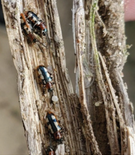Jan 5, 2023Managing asparagus beetles all year long
Asparagus beetles are a regular yet troublesome sight in asparagus fields during the summer. These pests, however, are in asparagus fields all year long. While it may seem like this is more bad news, staying on top of asparagus beetles year round is important for the longevity and health of the fields.
Researchers at Michigan State University have been investigating a variety of beetle management methods that farmers can use, no matter the time of year.
Winter management
Most asparagus growers are familiar with those pesky asparagus beetles munching on the crop – we see them all spring and summer – but where do they go in the winter months?
Asparagus beetles begin overwintering as adults from late September to October. While the beetles can overwinter in nearby woods, their favorite place is inside of the crop field. In asparagus fields, more beetles survive the winter when they can hide in decaying asparagus stalks left over from the previous season or among deciduous leaves blowing in from surrounding woods (Fig. 1).
they can hide in decaying asparagus stalks left over from the previous season or among deciduous leaves blowing in from surrounding woods (Fig. 1).
Asparagus farms that have more dead trees in the surrounding woods have fewer asparagus beetles, indicating that deciduous leaves swept by the wind into the asparagus field can provide overwintering shelter. So both deciduous leaf litter and hollow asparagus stalks are sustaining beetle populations through the winter.
Residue management may be the key to controlling these overwintering populations. Breaking down the plant residue left in the field for winter could allow the decaying process to disintegrate pieces of overwintering material. The Vegetable Entomology Lab at Michigan State University is currently planning trials using different times of mowing to reduce beetle overwintering sites.
Spring and summer management
Asparagus beetles start their activity in the spring right before asparagus harvest begins. They find tender new stalks to devour and lay eggs on. When asparagus stalks are ready to harvest, beetle populations are reaching their peak.
 To manage beetles during harvest, an effective insecticide spraying regimen is essential. Common conventional insecticide active ingredients include acetamiprid, methomyl, permethrin and carbaryl. However, organic insecticide options like neem oil, pyrethrum and spinosad could be useful because of their short pre-harvest intervals.
To manage beetles during harvest, an effective insecticide spraying regimen is essential. Common conventional insecticide active ingredients include acetamiprid, methomyl, permethrin and carbaryl. However, organic insecticide options like neem oil, pyrethrum and spinosad could be useful because of their short pre-harvest intervals.
In June 2020, MSU researchers conducted a spray trial with both conventional and organic (Organic Materials Review Institute-certified) insecticides to determine how insecticides with a 24-hour pre-harvest interval perform to control asparagus beetle adults and egg laying during harvest on spears.
We did the spray trial in a research plot in Hart, Michigan, with eight insecticides applied by overhead spraying (Table 1). We released asparagus beetles into the experimental plot and counted numbers of beetles and eggs 24 hours later.
The best performing synthetic insecticides were carbaryl, Coragen (chlorantraniliprole) and the best organic insecticide was Entrust (spinosad) (Fig. 2). Two organic insecticides (Permethrin, Neem) did not perform well compared to the other insecticides.
We did not find any beetles or eggs in the other plots, so it is difficult to know how these performed relative to the other treatments.
While asparagus harvest ends in June, asparagus beetle activity continues throughout the summer.
Foliar spraying of the fern should occur when 10% of plants are defoliated, or 50% of the plants have larvae. Because asparagus is a perennial vegetable crop, understanding the impacts of effective beetle management is important to create sustainable methods. Future studies investigating management methods for asparagus beetles is necessary, no matter the season.
– Authors: Jen Zavalnitskaya & Zsofia Szendrei, Michigan State University, Department of Entomology, East Lansing, Michigan.
– Photo: In asparagus fields, more beetles survive the winter when they can hide in decaying asparagus stalks left over from the previous season or among deciduous leaves blowing in from surrounding woods.
















